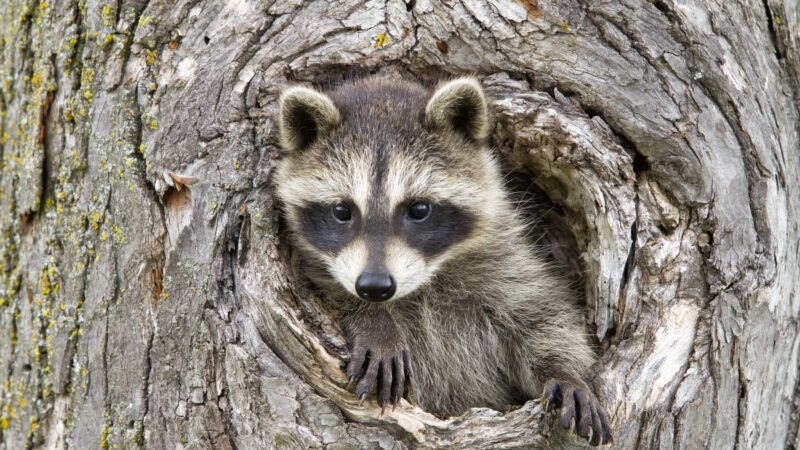Michigan Farmer Rescued Injured Animals Without the Proper Permits. State Officials Have Charged Her With a Misdemeanor and Euthanized the Animals.
State officials euthanized six of Julie Hall's animals, including Sassy, a blind raccoon, and Po, a one-legged crow.

For years, Julie Hall has been running a small animal rescue operation without incident on her farm in the northern Michigan town of Petoskey.
That ended in late January when state wildlife officials showed up at her door in response to a complaint that she was taking in animals without the proper permits. Hall has since been charged with a misdemeanor, and six of her animals, including a blind raccoon and a one-legged crow, were confiscated and euthanized by the state.
"I truly did not know I was breaking the law because I had done this all my life, as a farmer, I'd done this," says Hall. "Had I known I was such a criminal, I would have never done it. I'm not built that way."
The state's Department of Natural Resources (DNR) says that licensing requirements exist to prevent rescued wild animals from becoming a danger to the community and that it had no choice but to put down the animals collected from Hall's farm.
"We put out press releases every spring saying, do not pick up wildlife, do not keep wildlife, do not take wildlife out of the wild. It's illegal and it's not good for wildlife," said Jim Gorno, an official with DNR, to the Charlevoix Courier in late February. "What happens is the wildlife is raised, sometimes if you let it go, they become a nuisance or even a disease issue here."
Hall has been taking in animals at her family's KeiJu Farm for decades. She candidly admits that she didn't have the required state permission to be a Michigan Licensed Rehabilitator.
Everyone from farmers and friends to members of the community would bring her all sorts of creatures in need of help, she says, from animals injured by hunters to orphaned baby raccoons.
"We have nothing but wildlife up here. We've moved into their homes. It's our responsibility when something like that happens," she says of her animal rescue work.
Hall, assisted by a crew of volunteers, would do what she could to nurse the animals brought to her back to health so that they could be released back into the wild. Animals that came to her as babies were taught to fish, hunt, and fend for themselves before being let go, she says.
Those animals with more serious disabilities—or which failed to pass tests showing they would be able to survive in the wild—she kept around permanently alongside her domesticated goats, chickens, and alpacas.
"I'm not a fool. I know exactly how this works. I've read articles, books. I've done this all my life," she says.
The crackdown on her rescue operation, Hall says, came after a disgruntled volunteer—who she had let go for stealing—complained to a number of state agencies about her farm.
A few of these agencies conducted uneventful site visits in response to those complaints. Officials from the state's Department of Agriculture showed up, she says, but left after finding no violations and helping her move some hay around.
Things went differently when DNR officials showed up at her farm on January 28.
"Four DNR vehicles pulled into my driveway like SWAT," Hall says. "I think they were expecting me to be erratic. I calmly and quietly took them to the enclosures where the animals were."
What followed was a traumatizing experience for Hall. DNR officials went around scooping up the unpermitted wild animals she was keeping on her farm, including Sassy, a blind raccoon, and several Canadian geese who'd been wounded by hunters and had been living on Hall's farm for a few years.
"Sassy didn't want to move for nothing," recalls Hall. "She didn't want to come. She could sense something was wrong."
A deer that Hall had taken in as a fawn was euthanized that day on the farm. DNR officials gave the animal two injections, one to put it to sleep, and then another to put it down.
"It was so horrible," says Hall, tearing up. "I couldn't fix anything."
The Charlevoix Courier reports that six animals in total were eventually euthanized by DNR. Hall was charged with holding wild animals in captivity without a permit, a misdemeanor offense.
Hall is currently working to get the necessary permits to restart her rescue operation. But that effort could be derailed if she is convicted. She says that she intends to fight the charge, and that a court hearing is set for March.
Hall is clearly rankled that her rescue work has become a legal issue. "If you love and care for an animal," she says, "it's against the law."
Rent Free is a weekly newsletter from Christian Britschgi on urbanism and the fight for less regulation, more housing, more property rights, and more freedom in America's cities.


Show Comments (130)